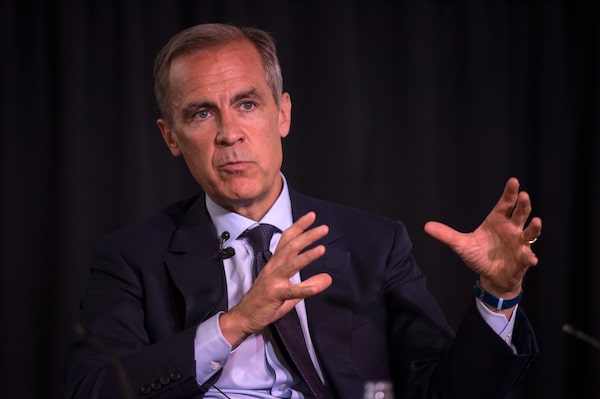
Mark Carney said his private conversations with bank leaders have shown that they remain committed to GFANZ.OLI SCARFF/AFP/Getty Images
Mark Carney denied that major U.S. banks are considering dropping out of his global coalition of financial institutions aiming for net-zero carbon emissions, weeks after media reports suggested the group was in danger of breaking ranks over legal worries.
Mr. Carney, a former Bank of Canada governor who later served as governor of the Bank of England, told British parliamentarians on Monday that the coalition, called the Glasgow Financial Alliance for Net Zero (GFANZ), was progressing in its quest to get its 500 member institutions to disclose data showing their emission targets and strategies.
Under the group’s rules, all its members must align their investments with guidelines set by Race to Zero, a United Nations campaign that leads decarbonization initiatives for entities below the national government level. Banks reduce their carbon footprints by scaling back investments in companies that cause harmful greenhouse emissions, or by helping those companies implement technologies such as carbon capture.
The U.K. tax cuts: With one foot on the brakes, it’s foolish to stomp on the gas
Last month, The Financial Times and Bloomberg reported that JP Morgan Chase, Morgan Stanley and Bank of America had all said in closed-door meetings that they were considering quitting GFANZ and its subgroup, the Net Zero Banking Alliance. The banks fear that if they, as a group, are required to abandon investments in high-emitting sectors, they could be subject to antitrust enforcement action.
Mr. Carney, who now serves as the United Nations’ special envoy for climate action and finance, said his private conversations with those banks’ leaders have shown that they remain committed to the collective effort.
“A: They haven’t left. And B: They haven’t indicated to me any intention to do so,” he told the British House of Commons environmental audit committee. “I would sort of put more weight on conversations I’ve had with CEOs of institutions than unsourced things I read in the press and then get repeated by others.”
Mr. Carney announced with fanfare at the COP26 climate summit in Glasgow last year that GFANZ, which was six months old at the time, had grown to include 400 banks, insurers and asset managers responsible for US$130-trillion in assets. The group has since expanded. With COP27 set to start in Egypt next month, GFANZ is now working to boost the participation of institutions in Asia and Africa.
Over the summer, Race to Zero published updated requirements that included an explicit call for members to “phase down and out” development and financing of new fossil fuel assets, and to make no new investments in coal. The wording caused consternation among the banks, prompting Race to Zero to issue a clarification in September. The change addressed the potential legal problems by removing requirements for common strategies among members, Mr. Carney said. It was “a tension that needed to be reconciled,” he added.
JP Morgan Chase spokesperson Steve O’Halloran declined to comment on Mr. Carney’s remarks. Officials with Morgan Stanley and Bank of America did not immediately respond to requests for comment.
The goal of GFANZ is to align the world’s financial systems behind the goal of limiting the average rise in global temperatures to 1.5 degrees above preindustrial levels by 2050. That’s what scientists say is necessary to avoid the worst effects of climate change.
Canada’s big banks have also expressed qualms about the implications of their participation in GFANZ, senior banking sources told The Globe and Mail late last month. The institutions have all taken the position that they will help oil and gas clients with decarbonization efforts rather than halting financing to them – a stance that has been reinforced by renewed focus on energy security amid global oil and gas shortages.
Environmental activists have said only divestment from oil and gas will get the world to net zero, and that voluntary measures, such as those championed by GFANZ, should be replaced by government regulation.
In his comments on Monday, Mr. Carney said voluntary measures are better than no measures, and that the data GFANZ members are providing on emissions stemming from the companies they finance will promote transparency. Any members that view the requirements of membership as too stringent, or that want to avoid public scrutiny of their climate programs, are free to leave, he said. “But they’re answerable for that.”